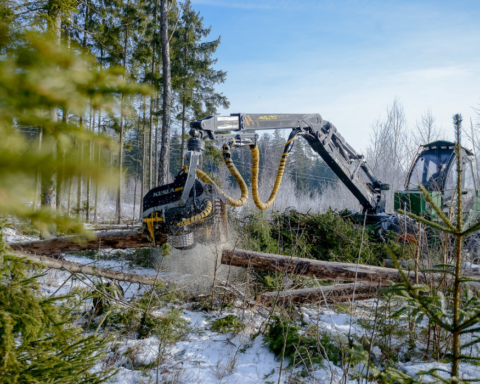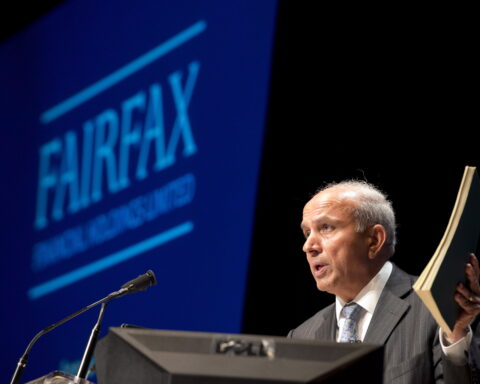While some Canadian pension funds “made helpful but modest tweaks” to their climate policies in 2023, even the leaders in the field lagged behind international peers in their efforts to build climate urgency into their investment choices and exclude fossil fuels from their portfolios, a watchdog group reports this morning.
Among the 11 funds surveyed, the Canada Pension Plan Investment Board (CPPIB), which manages retirement savings for more than 22 million Canadians, “stands out as the biggest investor in and defender of fossil fuel investment in the Canadian pension sector,” Shift Action for Pension Wealth and Planet Health concludes in its second annual Canadian Pension Climate Report Card. “CPPIB appears to have an ideological commitment to fossil fuel investment.”
But across the sector, despite the extreme weather and devastating impacts Canadians saw in the warmest year on record, “reactions to these climate shocks did not, however, translate into commensurate action from Canada’s largest pension managers,” the report card says.
“This is troubling because pension funds have an inherently long-term investment horizon and a fiduciary duty to protect the interests of all of their members, including their youngest contributors, who won’t be retiring for several decades” and are particularly vulnerable to climate impacts.
Even in the year when the international community “finally named the primary culprits behind the climate crisis,” Shift adds, “Canadian pension funds still seem to have missed the message,” continuing to “invest their own members’ retirement savings in companies that are accelerating the climate crisis.”
“Despite a summer that saw smoke-filled skies blanket Canadian cities and some of the worst air quality in the world, last year most of Canada’s pension managers acted as though climate action is not an urgent concern,” Shift Action Pension Engagement Manager Laura McGrath said in a release. “For the majority of Canadian pensions, there is a mismatch between the incremental pace of climate progress and the need for urgent action to prevent irreversible climate breakdown.”
CPPIB Lags the Field, Earns Praise from Oil and Gas
The report acknowledges that some Canadian pension funds have published ambitious climate strategies, emission reduction targets, and decarbonization plans. But others “have only begun to grapple with the implications of the urgent, transformative investment and asset management decisions that need to be made to ensure their members can count on their pensions in a safe climate future.”
The Canada Pension Plan does not emerge as a leader in Shift Action’s analysis. CPPIB was “the only fund assessed in this report card that received a lower score in any category than the previous year,” the report card says, with its rating in the coveted Climate Urgency category falling from a B to a C. The fund also failed to require its owned companies to publish science-based net-zero targets with plans to achieve them, encourage those companies to reduce fossil fuel production, or to explain how it “escalates its engagement” with companies that don’t align their practices with the demands of the climate crisis.
But CPPIB’s performance was sufficient to earn praise from the fund’s former head of global affairs, Lisa Baiton, now CEO of the Canadian Association of Petroleum Producers. “It’s really terrific that there are institutions like my former employer who have publicly acknowledged that it is possible to have meaningful net-zero commitments, while concurrently acknowledging that global demand for all sources of energy is going to continue for decades to come, [and] that have continued to unapologetically support the entire energy spectrum,’ she told Yahoo Finance.
Yet major Canadian oil and gas players like the Pathways Alliance, whose six members account for 95% of the country’s oilsands production, have not been putting investment dollars behind those commitments, preferring instead to hold out for more lavish taxpayer subsidies for their emission reduction plans.
“You couldn’t make this stuff up,” Shift Action responded to Baiton on social media. “So we’ll ask again: is @cppinvestments a prudent pension manager investing in the best long-term interests of 22 million Canadians, or a cheerleader for Canada’s oil & gas industry?”
Inconsistency and Greenwashing
Across the sector, the report cites inconsistent asset disclosure, lack of transparency around fossil fuel investments, and what it calls the “obfuscation” of terms like “green assets” and “transition assets” as factors that make it “nearly impossible” to assess pension funds’ performance.
Greenwashing “remains commonplace,” Shift says, while CPPIB “continue to make risky investments in fossil fuel expansion and to propagate dangerous myths about the role of the oil and gas industry in the energy transition.”
“Leading international pension funds recognize there is no credible or profitable pathway for engaging fossil fuel producers to act in line with climate safety,” and “have each moved to screen out new fossil fuel investments while phasing out existing holdings,” Shift Action Senior Manager Patrick DeRochie said in the release. “Canadian pension managers need to catch up—and stop pouring members’ retirement savings into companies that are accelerating the climate crisis.” With four of the 11 funds beginning to break away from the pack, Shift divides the group into three tiers:
• The Caisse de dépôt et placement du Québec (CDPQ), the University Pension Plan (UPP), the Ontario Teachers’ Pension Plan (OTPP), and the Investment Management Corporation of Ontario (IMCO) receive ratings of B+ to B-.
• The Ontario Municipal Employees Retirement System (OMERS), the Healthcare of Ontario Pension Plan (HOOPP), the federal Public Sector Pension Investment Board (PSP), the British Columbia Investment Management Corporation (BCI), the CPPIB, and OPSEU Pension Trust (OPT) all fall in the C+ to C- range.
• The sometimes hapless Alberta Investment Management Investment Corporation earns an overall grade of D.
PSP, BCI, and AIMCo receive failing grades for efforts to align their investment strategies with the goals of the 2015 Paris climate agreement. OTPP, PSP, BCI, CPPIB, OPTrust, and AIMCo earn F’s for their lack of progress excluding fossil fuels from their investments.
By contrast, three international funds—Stichting Pensioenfonds ABP in the Netherlands, Ircantec in France, and New York City Public Pensions—all earn average scores of A-, and A- or better for aligning with the Paris agreement and dropping fossil fuels.
The report card cites “notable progress” in climate policies at CDPQ, UPP, IMCO, and OTPP, with IMCO emerging as a Canadian leader by improving its scores in three out of six categories over a single year. It identifies OMERS and HOOPP as the two most improved pension funds in 2023, while pointing to a “sophisticated but contradictory approach to the climate crisis” at CPPIB—the only one of the 11 pension funds that addresses end use or Scope 3 emissions, but one of the few that have failed to set interim emission reduction targets.







